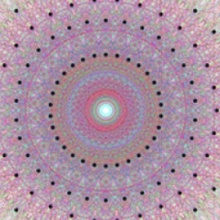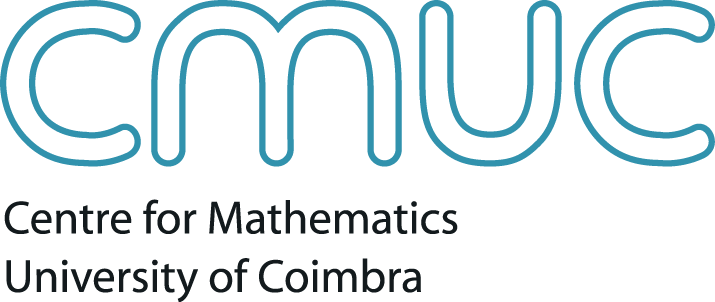
Workshop of the Seminar of Representation Theory and Related Areas
The Seminar of Representation Theory and Related Areas was started in 2010 and emerged from an informal seminar of mathematicians from the Maths Departments of the Universities of Coimbra, Lisboa and Porto, with research interests in Representation Theory of Groups and Algebras, as well as Combinatorics.
The group aims to pursue and develop interactions between Representation Theory, Geometry, Combinatorics and other relevant areas. Participation is open to anyone with interests in these and other related areas.
This 2025 edition of the workshop runs in collaboration with the PhD Program in Mathematics PIUDM* and takes place on November 14, 2025 at the Maths Department of FCUP (room 031). Participation is free but registration is necessary to guarantee access to the event and the coffee-breaks. Use this form to Register.
10:25 Opening
10:30--11:30 Marco Mackaaij (Universidade do Algarve) Slides
*** Coffee break ***
12:00–13:00 Carlos Florentino (Universidade de Lisboa) Slides
+++ Lunch break +++
14:30–15:10 Jonathan Nilsson (Linköping University)
15:15–15:55 Carla Rizzo (Universidade de Coimbra) Slides
16:00–16:40 Christian Lomp (Universidade do Porto) Slides
*** Coffee break ***
17:00–17:40 Alfilgen Sebandal Slides
17:45–18:05 Nirina Albert Razafimandimby (Universidade do Porto) Slides
18:10–18:30 Francisco Moreira (Universidade de Lisboa) Slides
18:35–18:55 Bernardo Cunha (Universidade de Santiago de Compostela) Slides
19:30 Conference Dinner
Title: Induction for categorical representations
Abstract: Induction and restriction play an important role in the representation theory of groups and
algebras. It is therefore natural to look for a categorical analog in the categorical
representation theory of monoidal categories (or, more generally, of bicategories).
In my talk, I will first sketch such an analog in general and then say a few words about induction
for affine type A Soergel bimodules. I will try to keep the presentation reasonably self-contained.
In particular, no prior knowledge of Soergel bimodules is required.
This is joint work With Vanessa Miemietz and Pedro Vaz.
.........................................................
Title: Topology and Arithmetic of commuting tuples in Lie Groups
Abstract: The space of representations of a finitely generated group H into a complex reductive Lie group G is an algebraic variety with very rich geometric and topological properties. Considering representations up to equivalence, we call the resulting space the G-character variety of H.
In this talk, we focus on the commutative case and on some of the simplest groups G: When H is free abelian, and G is GL_n or the complex orthogonal/symplectic groups, the topological invariants are given by simple and explicit formulae.
Surprisingly, the same explicit calculations allow us to count the number of points of these character varieties in finite fields: in particular, we obtain the number of points in finite fields of the variety of n-tuples of commuting matrices, up to simultaneous conjugation.
This is joint work with S. Lawton (George Mason) and J. Silva (ISEL).
.........................................................
Jonathan Nilsson (Linköping University)
Title: Lie algebra modules on which a distinguished subalgebra acts freely
Abstract: Representation theory of Lie algebras is a vibrant subject with deep connections throughout mathematics and physics. Although a complete classification of simple Lie algebra modules is beyond reach in general, several important families of modules have been thoroughly studied, including finite-dimensional modules, Whittaker modules, and Gelfand–Zetlin modules. In recent years, a new perspective has gained traction: studying categories of modules where a distinguished subalgebra acts freely. This has led to the discovery of several new families of simple modules. I will survey recent developments and present my own contributions, focusing on "U(h)-free modules", a class of modules which can be viewed as a counterpart to the classical weight modules.
.........................................................
Title: Generalized polynomial identities: $W$-algebras, multipliers and representations
Abstract: Let $ W $ be a unitary associative algebra over a field $ F $ of characteristic zero. An associative $ F $-algebra $ A $ is called a $W$-algebra if it is equipped with a structure of a $W$-bimodule satisfying certain additional ``associativity conditions''.
To formally describe the action of $ W $ on $ A $, it is useful to consider the multiplier algebra $ \mathcal{M}(A) $ of $A$, a powerful tool with applications across several areas of mathematics, from non-commutative analysis in the theory of $ C^* $-algebras to category theory. Multipliers allow a more flexible approach to structural questions and provide a practical setting for studying identities in $ W $-algebras.
A generalized polynomial identity, or $W$-identity, of the $W$-algebra $A$ is a polynomial $f(x_1,\ldots, x_n)$ of the free $W$-algebra $W\langle X\rangle$ that vanishes under all substitutions of the variables $x_i$ by elements of $A$.
Roughly speaking, $f(x_1,\ldots, x_n)$ is a non-commutative polynomial in which elements of $ W $ appear between the variables. Clearly, this notion extends the classical theory of polynomial identities, which corresponds to the special case $W=F$
In this talk, I will present recent advances in the theory of generalized identities, developed in a way that is independent of the specific structure of $W$. I will emphasize how the multiplier algebra $\mathcal{M}(A)$ provides a unifying framework for their study, and I will illustrate how representation theory plays a central role in this development.
.........................................................
Title: Families of Semisimple Hopf Algebras and Their Actions
Abstract: Etingof and Walton (2014) proved that any action of a semisimple complex Hopf algebra on a commutative domain factors through a group action, a result later extended to Weyl algebras, enveloping algebras, and Ore extensions. The eight-dimensional Kac–Paljutkin algebra provides a notable example of a non-trivial semisimple Hopf algebra, admitting a non-group-like action on a quantum plane. Pansera subsequently introduced a family of semisimple Hopf algebras $H_n$ of dimension $2n^2$, with $H_2$ corresponding to the Kac–Paljutkin case.
In this talk, we present a wider family of semisimple Hopf algebras $H_{n,m}$ of dimension nmm! (for $n,m\geq 2$), which includes Pansera’s family as the subfamily $H_{n,2}$. Each $H_{n,m}$ is an extension of the group algebra $KS_m$ by $K{\mathbb{Z}}_n^{\otimes m}$ and can be realized as a crossed product. We also exhibit irreducible m-dimensional representations that are inner faithful and give rise to nontrivial actions on quantum polynomial algebras.
.........................................................
Title: Leavitt path algebras: Representations and K-theory
Abstract: In the 1960s, W. Leavitt studied a class of universal algebras which do not have a well-defined dimension, later called the Leavitt algebras. In two simultaneous but independent studies by G. Abrams and G. Pino, and P. Ara et. al., an algebra arising from a directed graph has been introduced called the Leavitt path algebra which turned out to be the generalization of a certain type of Leavitt algebra. In this talk, we shall see the K_0 and K_0^{gr} groups of Leavitt path algebras extracted directly from the geometry of the graph and use them as classification tools for its representations.
.........................................................
Nirina Albert Razafimandimby
Title: On the strong Poisson Dixmier--Moeglin equivalence
Abstract: The classification of irreducible representations of noncommutative algebras, such as universal enveloping algebras $U(\mathfrak{g})$ of finite-dimensional Lie algebras $\mathfrak{g}$, is a central but challenging problem in representation theory. The Dixmier--Moeglin equivalence, established in the 1980s, provides a deep connection among primitive ideals, rational ideals, and locally closed points in the prime spectrum of such algebras, yielding a powerful tool to characterize primitive ideals. Over the past two decades, the Poisson analogues of these concepts arising naturally from semiclassical limits have attracted considerable interest and motivated the study of the Poisson Dixmier--Moeglin equivalence (PDME).
In this talk, we explore the notion of a strong Poisson Dixmier--Moeglin equivalence, which extends the PDME by introducing degrees related to rationality, primitivity, and local closure in Poisson prime ideals. We review both the classical and strong versions of the PDME, discuss classical examples including the symmetric algebra of $\mathfrak{sl}_2$ and abelian Lie algebras, and highlight new counterexamples, such as certain Poisson Ore extensions related to Hermite polynomials that satisfy the classical PDME but fail the strong PDME.
Moreover, we outline recent progress on the validity of the strong PDME for larger classes of symmetric algebras of Lie algebras, and pose open questions about whether the strong PDME holds in general for symmetric algebras of semisimple Lie algebras.
.........................................................
Francisco Moreira
Title: Constructing supercharacter theories for inverse semigroups
Abstract: Supercharacter theories for groups is a topic that has been studied over the years, with supercharacter theories on finite groups being well defined. The goal of this presentation is to show that it is possible to construct a supercharacter theory for inverse semigroups in a simple (although extremely rudimentary) way, using the relation between an inverse semigroup, its maximal subgroups, and the supercharacter theories in each of these maximal subgroups. The presentation will also touch on the subject of Schur rings, and how the construction presented for inverse semigroups keeps the relation between supercharacter theories and Schur rings that is present in the finite group case.
.........................................................
Bernardo Cunha
Title: The failure of Weyl and Levi's Theorems in the compatible Lie algebra setting
Abstract: Two of the most fundamental results in the representation theory of Lie algebras are Weyl's Theorem and Levi's Theorem (valid for fields of characteristic zero). Weyl's Theorem tells us that finite-dimensional representations of simple Lie algebras are always decomposable into irreducible representations, which are much simpler to understand. Levi's Theorem allows us to decompose any Lie algebra into a semidirect product of a solvable ideal and a semisimple subalgebra, whose representation theory is well-known and simpler to work with than the general case.
A related notion to Lie algebras is that of compatible Lie algebras: given two Lie products on a vector space, they are said to be compatible if any linear combination of them is also a Lie product. These algebras arose from the related class of compatible Poisson algebras in the context of mathematical physics and Hamiltonian mechanics.
Despite many similarities with Lie algebras, compatible Lie algebras are sometimes strangely behaved. In this talk we explore how the aforementioned Weyl and Levi theorems fail in this setting and discuss the implications for the development of a theory for compatible Lie algebras.
If time allows, we will further discuss the representation theory of the smallest simple compatible Lie algebra.
Friday, November 14 2025
Room FC1 031
Departamento de Matemática da FCUP
Rua do Campo Alegre, 687
Porto
*The organizers thank the PIUDM for their support.
Ana Paula Santana (CMUC, Universidade de Coimbra)
Carlos André (CEMS.UL, Universidade de Lisboa)
Ivan Yudin (CMUC, Universidade de Coimbra)
Samuel Lopes (CMUP, Universidade do Porto)
Referência CMUP: UID/00144/2025, Doi: https://doi.org/10.54499/UID/00144/2025




